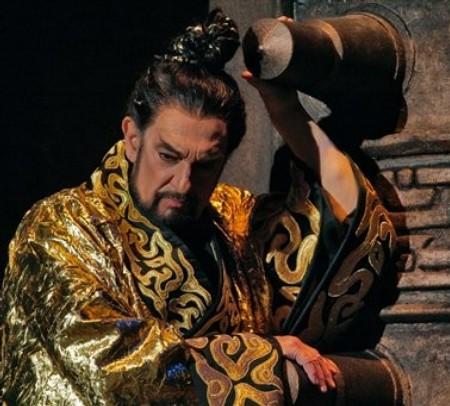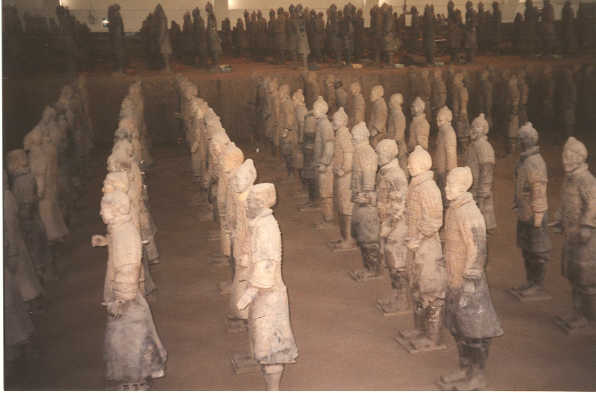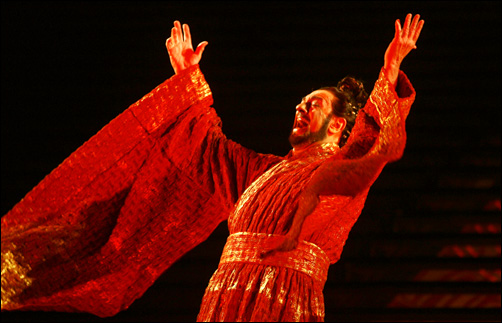Today my friend Peggy invited me to the Metropolitan Opera to see Tan Dun’s The First Emperor, with Placido Domingo in the lead. An opera at the Met is always an overwhelming experience, a heady mix of pleasures: A non-stop ride of pure sensuality that you feel down in your gut, conveyed through technique so controlled and precise it makes your head spin.
In some ways it’s almost the opposite of the Broadway Theatre. On Broadway they work hard to create the illusion that we’re all just folks, that maybe you could go out for a beer with that person up there on stage if you happened to meet them on the right day. On Broadway people applaud when the star first comes on stage, no matter what the play or the role, just as they’d applaud a celebrity walking onto the stage of The Tonight Show.

An Emperor learns the great price of power
At the opera, nobody applauded the star’s entrance. I mean, what kind of idiot would start clapping while Placido Domingo is singing? You really don’t want to be making any sounds when he is singing. You just want to be there while it lasts, in a state of quiet ecstasy. When we hear him sing the role of Qin Shi Huangdi, China’s first emperor (he of the Great Wall and the Terra Cotta army), we know we are not in the presence of a fellow mortal – we are in the presence of a god. The wonderful illusion of grand opera is that these beings we witness upon the stage are creatures of mythological proportion, visions from our deepest dreams made flesh.

The Terra Cotta army
The First Emperor is unusual in that Tan Dun attempts to combine two great traditions that have virtually nothing in common – the traditional Peking Opera and our own Western opera. Hs solution is to not so much combine them as to let them live side by side – characters singing in the Eastern tradition are not so much part of the action as they are a greek chorus that introduces it, pulling us back to a time more than 2200 years ago.
I found myself wondering whether Domingo could have sung in the Eastern mode, but he was never asked to. And that was clearly the right decision – his skill is a culmination of decades of training in a very specific discipline, and that skill would not have transferred over to a completely different discipline. One might as well expect Michael Jordan to play baseball!

Placido Domingo filling the opera house with glorious sound
Tan Dun does indeed combine the two musical traditions where it can be made to work – in the instrumental parts. He incorporates such exotic elements as Chinese singing drums into the orchestra, to great effect. In one lovely moment, while the musician Qi Yao, sitting onstage, plays the traditional zheng (a large traditional zither-like instrument), she is accompanied by the two harpists in the orchestra pit. Suddenly we notice the similarities between them – two very disparate musical traditions coinciding and merging into one. I also liked the way the members of the orchestra were called upon to chant and rhythmically shout. From where I sat looking down at them in a box seat, I could tell they were enjoying themselves immensely. That kind of thing doesn’t happen very often at the Met.
With all that, it was in essence like all grand opera – a tale of blood and revenge, great hatred and even greater love, and the workings of fate in all of its magnificent cruelty. And everything portrayed with opulant visuals slendidly realized and sweeping music beautifully sung. Yet it all came down to those voices, giving us a glimpse into the passions of gods. I ended up thinking about something a music critic once said: The two most essential elements of grand opera are sex and the dominant seventh chord.